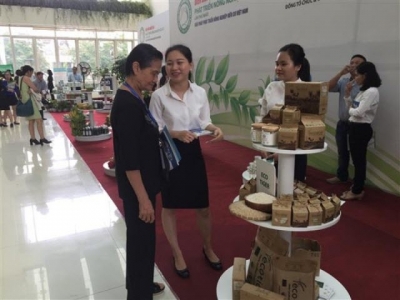Organic agriculture should not develop massively by trend movement

Under Vietnam's conditions, agriculture based on chemicals will still play a key role in ensuring national food security, stabilizing social security and contributing to ensuring international food security. Organic agriculture, will meet a segment of the high-end market.
Delegates visit and study Ecorice organic rice displayed at the forum. Photo: N.Hiền
This was affirmed by the experts at the First National Forum on Organic Agricultural Development entitled,"Solutions for development of organic agriculture in Vietnam",organized by the Vietnam Organic Agriculture Association at Ho Chi Minh City on 27th December 2017.
Mr. Le Quoc Phong, Vice-chairman of the Vietnam Organic Agriculture Association, andgeneral director of Binh Dien Fertilizer Joint Stock Company, said that agricultural land per capita in Vietnam was only 8.7% of the world’s average. To ensure food security, Vietnam has only one way to increase productivity, but to increase it, the development of chemical agriculture is compulsory. This is also the common trend of developing countries in the world.
According to Phong, organic agriculture can not be developed as a mass movement but must be based on soil conditions and climate of each region. At the same time, it is necessary to identify and select the exact type of product, scale and production area suitable to the needs of each market in order to exploit advantages of natural conditions, ensure national food security, to give priority to the Vietnamese high-value plant farming in association with ecotourism and in accordance with international regulations on standards.
According to Nguyen Van Bo, former director of the Vietnam Academy of Agricultural Sciences, organic agriculture is a way of production that requires strict requirements for producers and markets. Therefore, the development of agriculture should be harmonious and sustainable, in which the production of intensive cultivation and chemistry is still the main.
There are 26 organic farming establishments in 15 provinces and cities with a total area of4,100 hectares. The effective models are organic basa fish farming in An Giang, ecological shrimp farming in Ca Mau mangroves, of which10,000 hectares have been certified to export to the EU. Besides, there are also 33 farming establishments in organic method which are focusing on using organic fertilizers and biological plant farmingfor nearly 1,200 hectares of rice, 90 hectares of vegetables, 285 hectares of grapes and 79 hectares of apples. Some organic products have established their footholds in the market such as honey, vegetables, tea, pork and shrimp.
However, organic farming has currently less opportunities and faces many difficulties and challenges. This is mainly due to the rigorous farming process, the complexity and high cost of certification, asthere needs a long time forland reclamation, andthe consumption market is unstable.
Mr. Phong said that Vietnam does not have specific standards for each organic product. The National standards TCVN 1104: 2015 guiding production, processing, labeling and marketing of organic products issued by the Ministry of Science and Technology in 2015 has not really come into life and is ready to be replaced by the National Standard TCVN 11041: 2017 (being drafted) with more specific regulations.
Consequently, experts said that the improvement of standards for organic products in harmony with international standards, is essential for all entities involved in organic farming. This helps to control the market for organic agricultural products well, andremove fake organic products sold in the market.
At the forum, experts exchanged views on the organic farming process, the identification of product categories, andthe markets and scale of organic farming in Vietnam. Along with that, the Government needs to issue policies to attract economic sectors to the organic agriculture.
Có thể bạn quan tâm
 Arctic agriculture needs new crops
Arctic agriculture needs new crops Countries in the far north need to cultivate new varieties of crops if they hope to main local food production.
 Export goods spotlights 2017
Export goods spotlights 2017 Vietnam's agricultural, forestry, and fisheries (AFF) exports have seen spectacular performance in certain product categories and markets, such as processed
 2017 - An impressive year for agriculture sector
2017 - An impressive year for agriculture sector Hoang Trong Thuy, an expert from the Viet Nam Agriculture Technique Science Association, talks to Viet Nam News about achievements of the agriculture sector